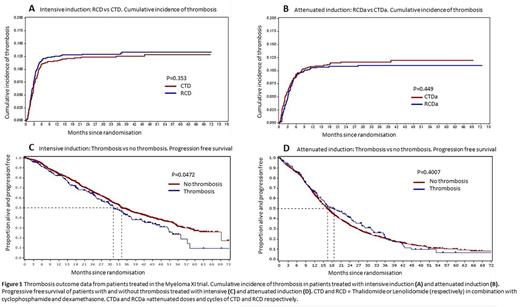Abstract

Background
Patients with Multiple Myeloma (MM) are at high risk of thrombosis due to a combination of disease, treatment and patient factors such as age and comorbidity. Newly diagnosed MM (NDMM) patients treated with regimes that include immunomodulatory drugs (IMiDs) and glucocorticoids are at highest risk.
Methods
Myeloma XI is a Phase III, UK-based, multicenter, open label, parallel group, randomized controlled trial for NDMM patients. Patients are initially randomised between a thalidomide or lenalidomide triplet combination with cyclophosphamide and dexamethasone. This IMiD triplet was continued for a minimum of 4 cycles (transplant eligible, TE, CTD vs CRD) or 6 attenuated dose cycles (transplant non-eligible, TNE, CTDa vs CRDa) and to maximum response. Patients with sub-optimal response were then randomised to receive CVD consolidation (cyclophosphamide, bortezomib and dexamethasone) or no consolidation (pre-transplant, if applicable). Patients were also randomised (post-transplant, if applicable) to receive lenalidomide maintenance, continued until disease progression vs observation. The protocol stipulated thrombosis risk assessment based on IMWG guidelines (Palumbo et al, Leukaemia 2008) and a minimum of 3 months thromboprophylaxis, with Low Molecular Weight Heparin (LMWH) recommended for high-risk patients and aspirin for low-risk or if LMWH is unsuitable. Here we present thrombosis outcome data from patients treated (n=3838) in the Myeloma XI trial.
Results
Overall, thrombotic events occurred in 11.8% of patients (569 events in 451 of 3838) of which 61.2% were male with a median age of 67y (range 37-89). Patients with and without thrombosis were not significantly different with respect to age, gender, performance status, ethnicity, paraprotein type, light chain type, or serum creatinine. Venous events were more frequent than reported arterial events (91.8% vs 8.2% of events). During induction, thrombosis occurred in 10.8% (524 events in 416 of 3838) at 6 months with no difference between cumulative incidence for CTD vs RCD (p=0.353) or CTDa vs RCDa (p=0.449). At the time of first thrombosis, 365 of 416 patients (87.7%) were receiving thromboprophylaxis (142 aspirin, 161 prophylactic LMWH, 24 treatment dose LMWH and 12 treatment dose warfarin). Out of patients with thrombosis, 55.0% (229/416) had been assessed as high-risk and of these, 203 (88.6%) were receiving thromboprophylaxis (31.0% aspirin (71/229), 44.1% prophylactic LMWH (101/229), 4.4% treatment dose LMWH (10/229) and 4.8% treatment dose warfarin (11/229)).
Patients with and without thrombosis did not have significantly different overall survival, but progression-free survival(PFS) appeared slightly reduced for TE patients who developed thrombosis (p=0.0472) (Figure 1).
During CVD consolidation, 4.5% of patients developed thrombosis at 12m compared with 2.4% with no treatment (p=0.023). During maintenance, 2.2% of patients on lenalidomide maintenance developed thrombosis at 36m compared to 0.2% on observation (p<0.001).
Discussion
In Myeloma XI, the incidence of thrombosis was high (11.8%), consistent with previous smaller studies using similar IMiD combination regimes. Patients were at highest risk throughout the first 6m of treatment and it may be reasonable to recommend a minimum of 6m thromboprophylaxis for NDMM patients receiving similar treatment. Lenalidomide and thalidomide appear to be associated with a similar thrombotic risk. Although lenalidomide maintenance increased thrombotic risk, the absolute risk was small and far less than in induction. The association with a reduction in PFS for TE patients developing thrombosis may be due to clinicians making changes in myeloma directed treatment resulting from thrombosis. There is also likely to be morbidity and psychological impacts associated with thrombosis that have not been assessed in this study.
Contrary to guidance, 12.3% of patients were not on thromboprophylaxis during induction prior to the thrombosis event and 31.0% of high-risk patients were on aspirin rather than the recommended LMWH. This may be due to difficulties with daily injections or other patient/clinician reasons. However, thrombosis predominantly occurred in patients who were on thromboprophylaxis (87.7%) which suggests new thrombosis prevention strategies are needed, particularly in the first 6m of treatment, and should be explored in future studies.
Bradbury: BMS Pfizer: Consultancy, Honoraria, Speakers Bureau; Novartis: Consultancy, Other: Travel support; Bayer: Other: Conference attendence; Amgen: Other: Conference attendence. Jenner: Novartis: Consultancy, Honoraria, Membership on an entity's Board of Directors or advisory committees, Speakers Bureau; Janssen: Consultancy, Honoraria, Membership on an entity's Board of Directors or advisory committees, Other: Travel Support , Research Funding, Speakers Bureau; Takeda: Consultancy, Honoraria, Membership on an entity's Board of Directors or advisory committees, Research Funding, Speakers Bureau; Amgen: Consultancy, Honoraria, Membership on an entity's Board of Directors or advisory committees, Other: Travel Support, Research Funding, Speakers Bureau; Chugai: Membership on an entity's Board of Directors or advisory committees; Celgene: Consultancy, Honoraria, Membership on an entity's Board of Directors or advisory committees, Research Funding, Speakers Bureau. Cook: Glycomimetcs: Consultancy, Honoraria; Takeda: Consultancy, Honoraria, Research Funding, Speakers Bureau; Amgen: Consultancy, Honoraria, Research Funding, Speakers Bureau; Sanofi: Consultancy, Honoraria, Speakers Bureau; Bristol-Myers Squibb: Consultancy, Honoraria; Janssen: Consultancy, Honoraria, Research Funding, Speakers Bureau; Celgene: Consultancy, Honoraria, Research Funding, Speakers Bureau. Pawlyn: Takeda: Honoraria, Other: Travel support; Janssen: Other: Travel support; Celgene: Honoraria, Other: Travel support. Jones: Celgene: Honoraria, Other: Travel Support, Research Funding. Drayson: Abingdon Health: Equity Ownership, Membership on an entity's Board of Directors or advisory committees. Owen: Takeda: Honoraria, Other: travel support; Celgene: Consultancy, Honoraria, Research Funding; Janssen: Consultancy, Other: travel support. Kaiser: Chugai: Consultancy; BMS: Consultancy, Other: Travel expenses; Takeda: Consultancy; Janssen: Honoraria; Amgen: Consultancy, Honoraria; Celgene: Consultancy, Honoraria, Research Funding. Gregory: Janssen: Honoraria; Celgene: Consultancy, Honoraria. Davies: Amgen: Consultancy, Honoraria; Seattle Genetics: Consultancy, Honoraria; Bristol-Myers: Consultancy, Honoraria; Celgene: Consultancy, Honoraria, Membership on an entity's Board of Directors or advisory committees; Takeda: Consultancy, Honoraria, Membership on an entity's Board of Directors or advisory committees. Morgan: Takeda: Consultancy, Honoraria; Bristol Myers: Consultancy, Honoraria; Celgene: Consultancy, Honoraria, Research Funding. Jackson: Janssen: Consultancy, Honoraria, Speakers Bureau; Celgene: Consultancy, Honoraria, Speakers Bureau; Takeda: Consultancy, Honoraria, Speakers Bureau; Amgen: Honoraria, Speakers Bureau.
Author notes
Asterisk with author names denotes non-ASH members.

This icon denotes a clinically relevant abstract


This feature is available to Subscribers Only
Sign In or Create an Account Close Modal